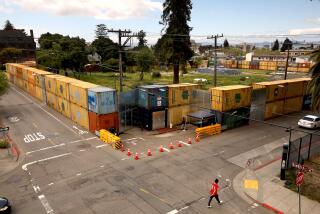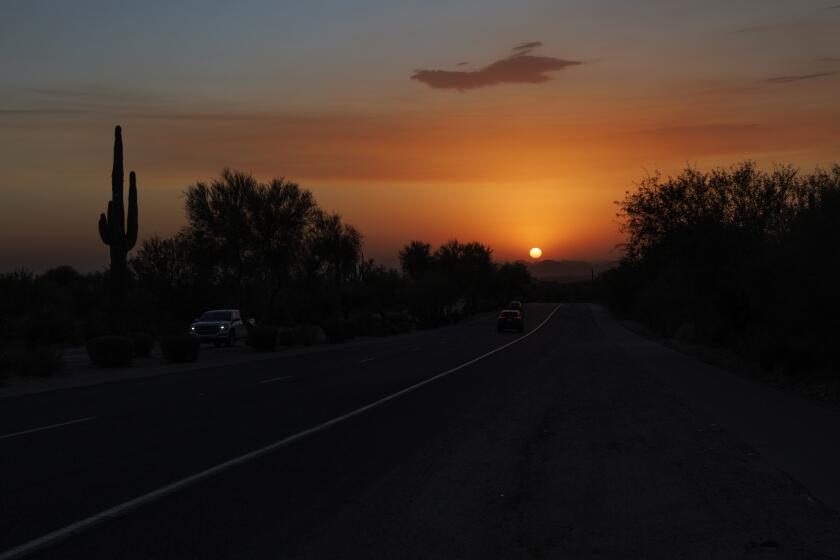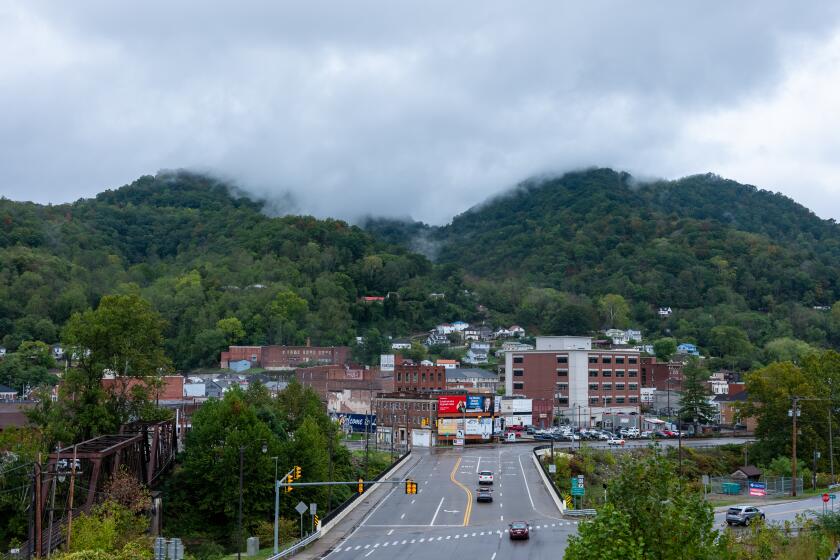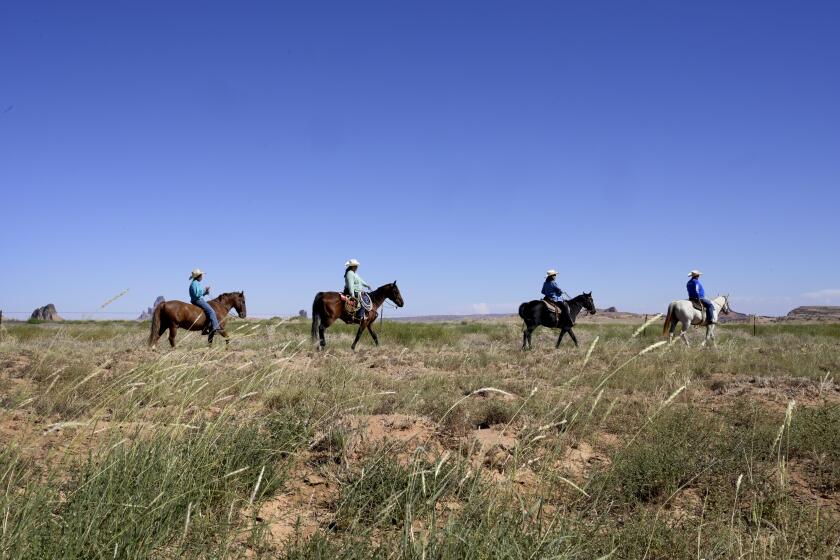State Environmentalists Fear Being Eclipsed by Economy
Leaders of California’s environmental movement, so elated at the election of President Clinton and Vice President Al Gore, now are struggling on several fronts to avert what they see as calamitous compromises by an Administration fearful of worsening the state’s economic crisis.
The battlefield stretches across much of California--from spotted owl territory in northern forests and the ailing Sacramento-San Joaquin River Delta to the air over Los Angeles and the eastern Mojave Desert, where a nuclear waste dump is proposed.
In each conflict, an Administration that relied heavily on California support in the last election must balance environmental concerns against the interests of some of the most powerful political forces in the state. Increasingly, environmentalists are worried by what they see as accumulating evidence that in these contests, economic interests may win out.
Although Administration officials insist that the economy must come first, they argue that there does not have to be a conflict between economic and environmental goals.
“Clearly, the state of the economy is the first concern of this Administration,” said Tom Epstein, the White House political coordinator for California. “But this is an Administration that doesn’t see the environment and the economy as necessarily in conflict.”
Environmental politics is full of contradictions. As William Schneider of the American Enterprise Institute points out: “Over 90% of the American people say they are environmentalists. Yet, only a small percentage feel so intensely about the environment, it drives their vote in presidential elections.”
Nevertheless, say Schneider and others, an election can turn on the hard work and enthusiasm of party activists.
In California, analysts note that as serious contributors, high-turnout voters and enthusiastic campaign foot soldiers, environmentalists have been crucial in a number of elections, most recently Barbara Boxer’s 1992 Senate victory.
In the 1970s, environmentalists’ support was key to the success of former Gov. Edmund G. (Jerry) Brown Jr. And they might be vital to Clinton in 1996 if, amid a continued lackluster economy, he enters the California primary in shaky condition.
Rep. George Miller, a Democrat from Martinez and a force behind environmental legislation, recalled that Gore’s addition to the Clinton ticket in 1992 “dramatically changed the state’s enthusiasm about the Clinton ticket in the early days.”
The Clinton Administration is hoping to sustain that enthusiasm through a series of what it calls creative compromises designed to accommodate economic and environmental interests. But as some deals have been fleshed out, the environmental community’s support has soured.
Last spring, environmentalists hailed a promise by U.S. Environmental Protection Agency officials to strengthen laws governing pesticides. But when the new regulations were announced in September, the reception cooled.
“It turned out we got a pig in the poke,” said Al Meyerhoff, a lawyer with the Natural Resources Defense Council, one of several groups that have taken issue with the proposed new law on pesticides.
The group contends that the EPA has left a large loophole in its strict, new health-based standards for approving pesticides. According to Meyerhoff, the EPA will set aside the standards in instances where banning a pesticide would cause a significant disruption of food production.
Environmentalists feel similarly let down by a recent decision involving the gnatcatcher, a rare songbird whose habitat in the coastal mesas and canyons of Southern California involves some of the country’s most valuable real estate.
In March, the Administration declared the bird a threatened species. But in the first major land use decision after the declaration, the Interior Department approved the construction of the San Joaquin Hills tollway through prime gnatcatcher habitat in Orange County. The decision won the praise of property rights advocates.
“An early, good sign from the Clinton Administration,” said Larry Arnn, president of the Claremont Institute, a think tank that champions private enterprise in environmental disputes.
“This toll road is very important for affordable housing in South Orange County,” Arnn said. “By relieving traffic congestion, it helps home builders overcome a significant hurdle to new development.”
But the toll road also triggered a lawsuit by two environmental groups, the NRDC and the National Audubon Society, which accused the Administration of violating the Endangered Species Act.
Despite these setbacks, environmentalists readily concede that they are in a better position to influence White House policy than they have been in more than a decade. The election of Clinton and Gore was followed by the appointment of several California activists to key slots in the Interior Department and the EPA.
Yet, leaders of the movement acknowledge that they have yet to learn how to make the most of their access. One knowledgeable source within the Administration agreed.
“Despite their access, the environmentalists have still been on the sidelines waving their arms much of the time,” said the source, who has participated in some of the policy decisions and asked not to be identified.
Meanwhile, the Administration’s penchant for deal-making on several issues, beginning with a plan for limited timber-cutting in ancient forests, has played well with the public, making it even harder for environmentalists to speak out in effective opposition.
“The Administration has been trying to set a new standard for creative compromise on a number of issues,” said the source. “It’s given industry and the environmental community 40% to 50% of what each has asked for. So, no one’s gone away happy. But the environmentalists in particular haven’t figured how to make the point that when you cut the baby in half, sometimes you kill it.”
Spokesmen for the Administration acknowledge the activists’ frustrations, but say that their pessimism is excessive.
“Environmentalists had very high expectations,” Epstein said. “They saw Al Gore on the ticket, they saw Bruce Babbitt come in as secretary of the Interior. They had 12 years of very much pent-up demand and expectations for environmental protection . . . and they wanted radical change right away.
“The environmentalists haven’t gotten everything they have wanted, but if they take the long view, there have been very significant changes already.”
Yet environmentalists see unnerving signs that in his quest to once again win the 54 electoral votes that were a keystone of his 1992 victory, Clinton’s emphasis on the economy will leave the environment in the lurch. In the six trips the President has made to the state since his inauguration, more than a dozen events have been organized to promote California’s economic recovery, but none have focused on efforts to protect its environment.
Moreover, the activists are nervous about the Administration’s mixed record on national environmental issues. They say the Administration quickly abandoned its proposed energy tax, offered only weak controls on development of the Florida Everglades, and is expected to back away from strong mandatory controls on greenhouse gases that contribute to global warming.
Although the environmental vote always has been important in California, the White House’s internal polling supports what other opinion surveys show--that environmental concerns have descended in priority among the public, just as concerns about jobs and incomes have risen.
“The results I’ve seen suggest that the anxiety about job loss is causing a tilt toward the development side,” said Richard Maullin, a Los Angeles pollster with considerable experience surveying for liberal candidates and causes, including the environment. “People want the economic benefits even if it means providing less environmental protection than what might be otherwise desirable.”
In the months ahead, environmental activists see a series of difficult issues, unresolved through the George Bush and Ronald Reagan Administrations.
For example, the recent settlement of a lawsuit in the San Joaquin River Delta requires the EPA to come up with a water-sharing formula to restore ecological health to the estuary, where a variety of fish are dying off.
The Administration’s challenge is to give the estuary enough water to revive without alienating important constituents, notably Central Valley agribusiness and Southern California urban consumers, who also rely on water from the delta.
Although the EPA has proposed a formula that pleases environmentalists because it would divert less water, the plan is under fire. State officials say the EPA formula would have a devastating impact on water supplies elsewhere. The Los Angeles-based Metropolitan Water District says it will be forced to drain reservoirs to meet local water needs.
The Administration faces an equally difficult quandary over smog.
In September, EPA Administrator Carol Browner directed California, which has failed to meet federal clean air standards for two decades, to revamp its system of smog-testing motor vehicles. Browner called for a new system that would take testing out of the hands of an estimated 9,600 privately owned service stations that now do the work. If the state does not comply, the EPA threatened to freeze up to $1.75 billion in annual highway funds to the state.
Protesting that it would destroy a $280-million testing business in the midst of a recession, a group of California legislators, most of them Democrats, opposed Browner’s plan. Later, she postponed threatened sanctions and negotiations between the state and the EPA are under way to find a compromise.
But the environmental movement’s anxiety over the direction of the negotiations was reflected in a lawsuit filed against the EPA by state Sen. Tom Hayden. The Santa Monica Democrat contends that under the Clean Air Act, Browner must invoke sanctions by Nov. 15 if the state has not agreed to her plan.
Environmentalists also are unsure of where the Administration stands on the proposed Ward Valley nuclear waste disposal site in the Mojave Desert. Opponents fear that the nearby Colorado River could become contaminated if the dump opens.
Shortly after he took office, Interior Secretary Babbitt rescinded a Bush Administration order transferring federal land to the state so the dump could be built. Babbitt said not enough was known about its potential dangers.
The federal government has not transferred the land and will not until it weighs evidence presented at hearings on Ward Valley this year. But recent statements by Babbitt have led some environmentalists to worry that his initial skepticism has faded. One Washington source close to the debate told The Times recently that there was growing sentiment within the Administration to go ahead with the dump.
White House spokesman Epstein said that on some issues the Administration may be compelled by law to make decisions environmentalists dislike. But he said the Administration also will comply with the law whenever it mandates environmental improvements, and he pointed to the San Joaquin Delta water dispute.
“We’re under a court order to fix things, to meet the requirements of the law and to satisfy these judges,” Epstein said. “There are certain supplies of water that must remain in the delta, and that will inevitably result in lesser supplies being shipped south.”
On Ward Valley, Epstein dismissed environmentalists’ complaints that Babbitt has decided to proceed with the dump. “Some people have suggested we’ve prejudged the outcome. . . . But the secretary has an open mind,” he said.
Clifford reported from Los Angeles and Richter from Washington.
More to Read
Get the L.A. Times Politics newsletter
Deeply reported insights into legislation, politics and policy from Sacramento, Washington and beyond. In your inbox three times per week.
You may occasionally receive promotional content from the Los Angeles Times.











